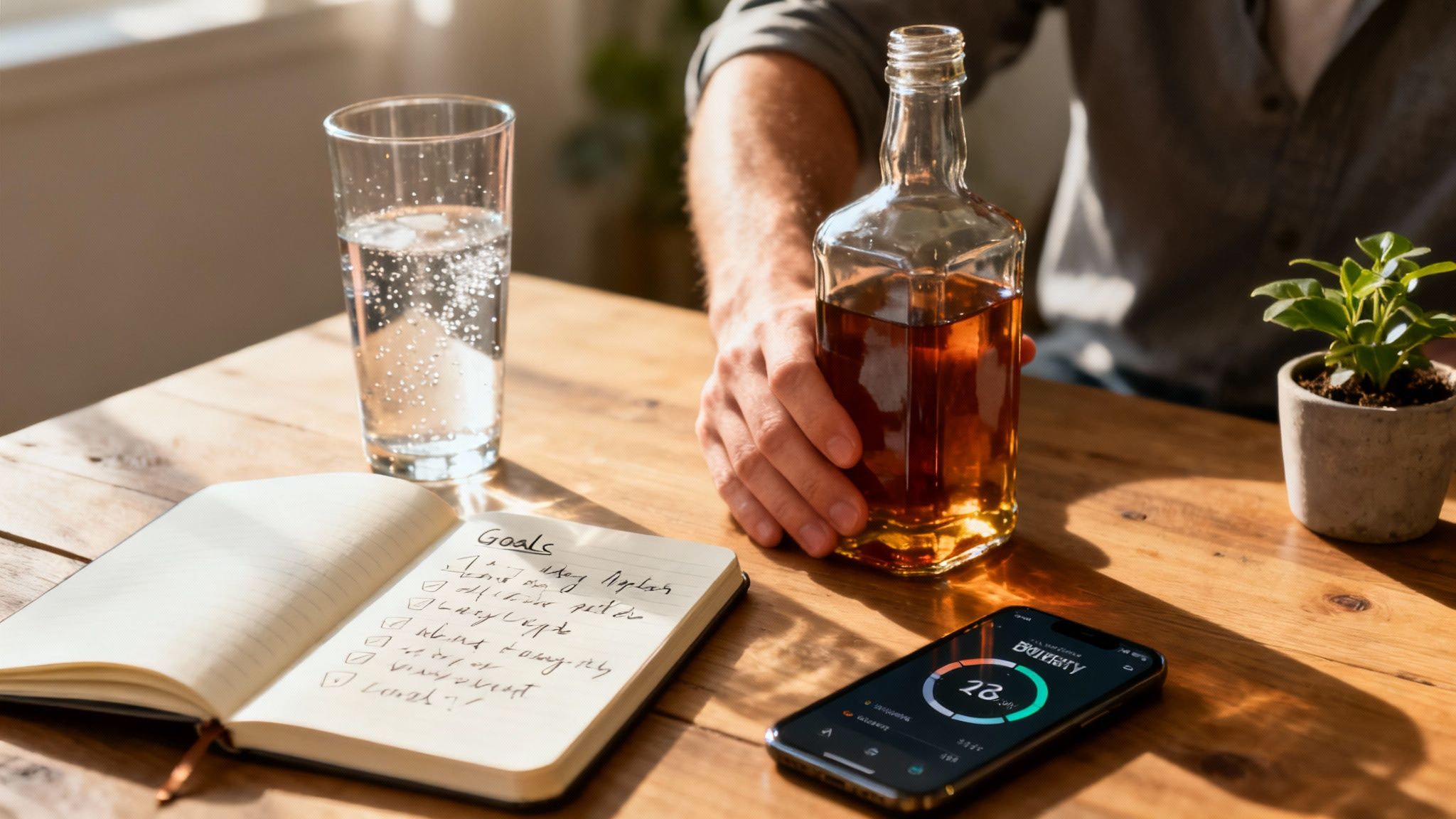
How to Quit Drinking Liquor A Realistic Success Guide
Making the decision to stop drinking liquor is a huge first step, and those initial few days are where you build the foundation for everything that comes next. The goal right now isn’t about being perfect; it’s about being prepared. We’re going to focus on creating a safe space, putting a simple support plan in place, and giving your body what it needs to get through this initial adjustment.
Your First Days Without Liquor
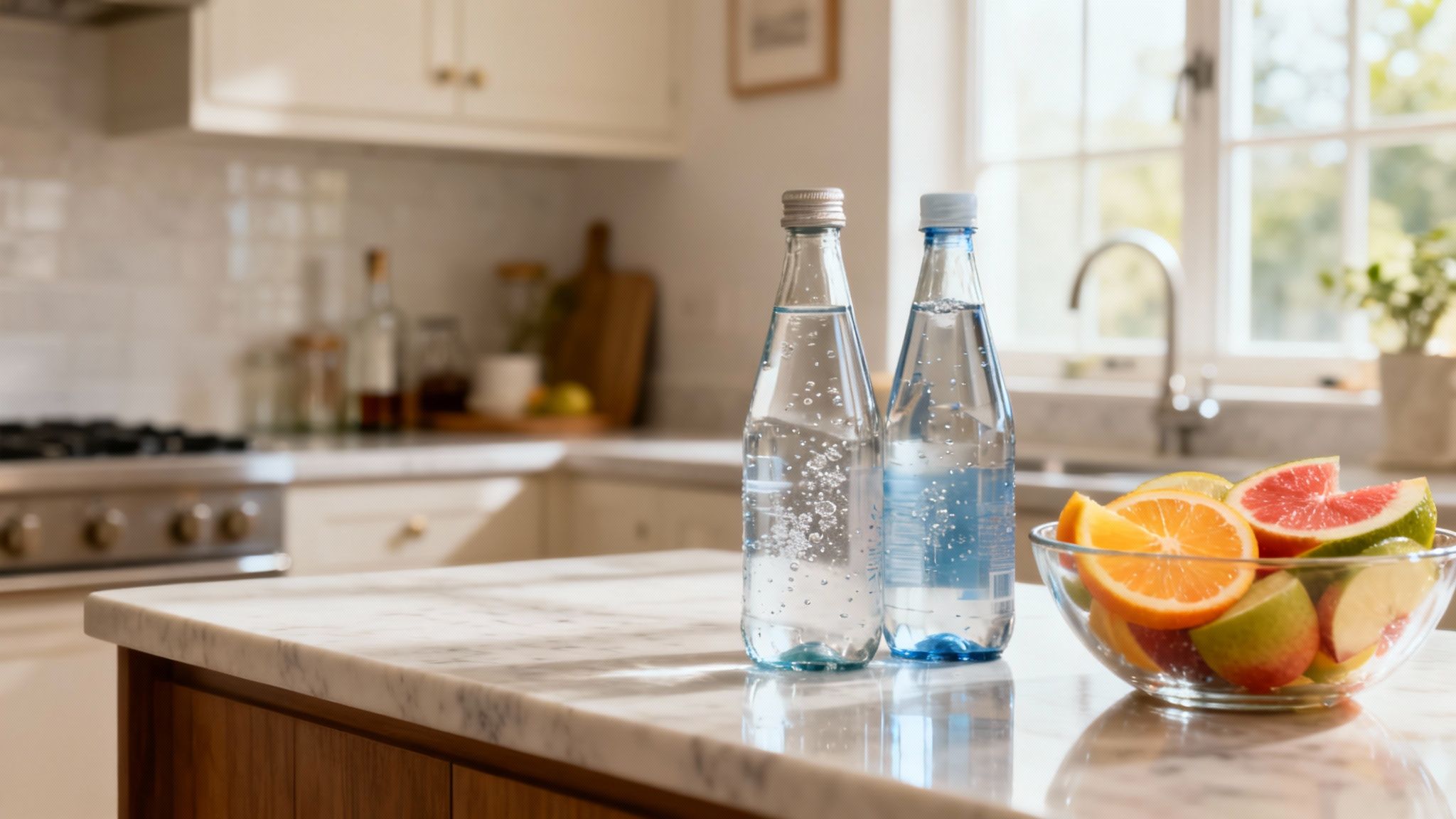
Alright, you’ve made the call. This is a powerful act of self-care, and how you handle the first 72 hours can really set the tone for your entire journey. Let’s get some practical, supportive structures in place so you can face these early challenges head-on.
Your environment is everything at the start. The most immediate, non-negotiable step is to remove all liquor from your home. Seriously, go through the kitchen, check the garage, look in those old hiding spots. The physical act of pouring it down the drain is a powerful symbol of your commitment.
Next, think about what you’ll say to people. You don’t owe anyone a big, dramatic explanation. Having a simple, pre-planned response like, “I’m taking a break from drinking for my health,” can save you a lot of anxiety when someone offers you a drink.
Grounding Yourself in Your ‘Why’
This is your anchor. Take a few quiet moments and just write down why you’re doing this. Is it for better sleep? More energy in the mornings? To be more present with your kids? Keep this list somewhere you’ll see it every day—stick it on the fridge, make it your phone’s lock screen, whatever works.
This ‘why’ is more than just a list; it’s your personal mission statement. When a craving hits or you feel that old pull, reading those words will remind you exactly what you’re fighting for.
It also helps to remember the bigger picture. According to the World Health Organization, alcohol consumption was linked to a staggering 2.6 million deaths in 2019, contributing to everything from heart disease to cancer. By making this change, you are taking a massive step toward a healthier future. You can learn more about this on the WHO’s official site.
Your Initial Action Plan
For the first few days, let’s keep it simple. Your job is to support your body and mind as they begin to recalibrate.
- Hydrate, Hydrate, Hydrate: Stock up on water, sparkling seltzer, herbal tea—whatever sounds good. Staying hydrated is key to managing withdrawal symptoms and gives you something to reach for.
- Plan Easy, Nourishing Meals: Your body is craving nutrients. Think simple, comforting foods for the next couple of days. Soups, smoothies, and simple protein with veggies are great options. Don’t worry about cooking anything complicated.
- Know What to Expect Physically: Your body is going through a big adjustment, and you’ll likely feel it. Understanding the physical side of withdrawal can make it feel less scary. For a detailed breakdown, our guide on the alcohol recovery timeline is a must-read.
To make things even clearer, here’s a quick-start plan for those crucial first three days. Think of it as your immediate to-do list.
Your First 72 Hours: A Quick-Start Plan
| Timeframe | Key Action | Why It Helps |
|---|---|---|
| Day 1 (First 24 hours) | Clear your home of all liquor. Tell one trusted person about your decision. | Removes immediate temptation and creates a safe space. Establishes your first line of support. |
| Day 2 (24-48 hours) | Focus on hydration and simple nutrition. Write down your “Why.” | Supports your body through initial withdrawal. Solidifies your motivation and gives you an anchor. |
| Day 3 (48-72 hours) | Plan a simple, sober activity you enjoy. Review your “Why.” | Begins the process of building a new, sober routine. Reinforces your commitment as challenges arise. |
Following these simple steps can make all the difference in building early momentum. You’ve got this.
Navigating Early Sobriety Challenges
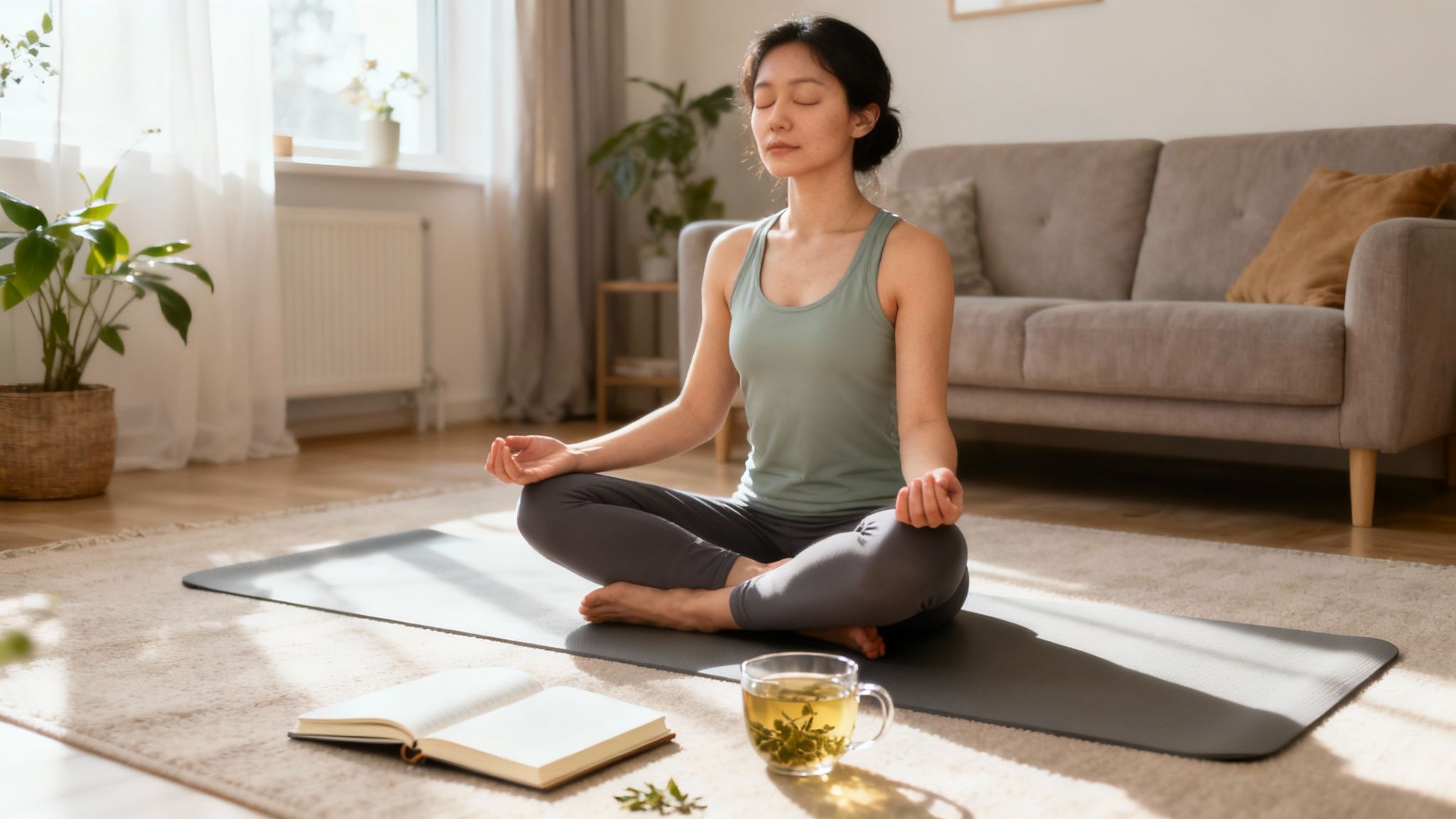
Let’s be honest: the first few days and weeks after you stop drinking liquor are intense. Your body and mind are going through a seismic shift as they adjust to a new normal, and that process comes with some real physical and emotional hurdles.
Knowing what’s coming isn’t about scaring you. It’s about equipping you, so you can walk into this with your eyes open and feel confident you can handle whatever comes your way.
What to Expect From Physical Withdrawal
When your body has come to rely on alcohol to function, taking it away causes a protest. This reaction is called alcohol withdrawal, and it’s a different experience for everyone.
For many, it feels like a nasty case of the flu. You might be dealing with headaches, nausea, shaky hands, and intense sweating. These symptoms usually kick in within 6 to 12 hours of your last drink and can be incredibly uncomfortable.
Typically, these common symptoms hit their peak around the 24 to 72-hour mark before they start to fade over the first week. It’s not pleasant, but it’s a clear sign that your body is already starting to heal and recalibrate.
Important Safety Note: Alcohol withdrawal can be dangerous and, in some cases, life-threatening. If you experience severe symptoms like hallucinations, seizures, extreme confusion, or a racing heart, seek medical help immediately. This is not something to tough out on your own.
Riding the Mental and Emotional Rollercoaster
The physical part is just one piece of the puzzle. For many, the psychological side of quitting liquor is the tougher, more persistent battle. Get ready for intense cravings, unpredictable mood swings, and maybe even a strange sense of grief or loss.
Cravings can feel like a tidal wave, hitting you with an overwhelming urge to drink out of nowhere. This is a completely normal physiological response. Your brain has been rewired by alcohol, and it’s screaming for what it’s used to. The most important thing to remember is that cravings are temporary—they always pass.
On top of the cravings, you might feel like your emotions are all over the map. One minute you’re hopeful and full of energy; the next, you’re irritable, anxious, or hit with a deep sadness. This is just your brain chemistry finding its new equilibrium. Give yourself some grace here—these swings are a normal part of the process.
Practical Strategies for Cravings and Moods
You are not powerless here. Having a few solid strategies in your back pocket can make all the difference when a craving or a tough mood strikes. Think of it as building a new toolkit for a new way of living.
Here are a few techniques that actually work:
- Urge Surfing: Instead of fighting a craving head-on, try to observe it. Acknowledge the feeling without judging it, almost like you’re watching a wave build, crest, and then crash on the shore. Notice the physical sensations, but remind yourself that you don’t have to act on them. It’s a mindfulness trick that puts you back in the driver’s seat.
- The Five-Minute Rule: When an urge hits, make a deal with yourself: you’ll just wait five minutes. In that time, do something—anything—to change your physical and mental state. Blast some music, do 20 pushups, walk outside, or call a friend. You’d be surprised how often the intensity of the craving plummets in just a few short minutes.
- Play the Tape Forward: This is a powerful mental exercise. When you find yourself romanticizing a drink, don’t stop there. Play the whole tape forward in your head. What happens next? The hangover, the anxiety, the regret, and the reasons you wanted to quit in the first place. This snaps you out of the fantasy and reconnects you with your “why.”
- HALT Check-In: More often than not, a craving is your body’s way of telling you it needs something else. Before you do anything, ask yourself: Am I Hungry, Angry, Lonely, or Tired? Taking care of that root cause—grabbing a snack, venting to a trusted friend, or even just taking a 15-minute nap—can make the craving vanish.
Getting through early sobriety is all about anticipating the rough patches and having a plan. It’s about being kind to yourself, using these practical tools, and remembering that every single craving you beat makes you that much stronger. This first phase is tough, no doubt about it, but it’s the foundation for a life that is so much healthier and more present.
Building Your Personal Sobriety Toolkit
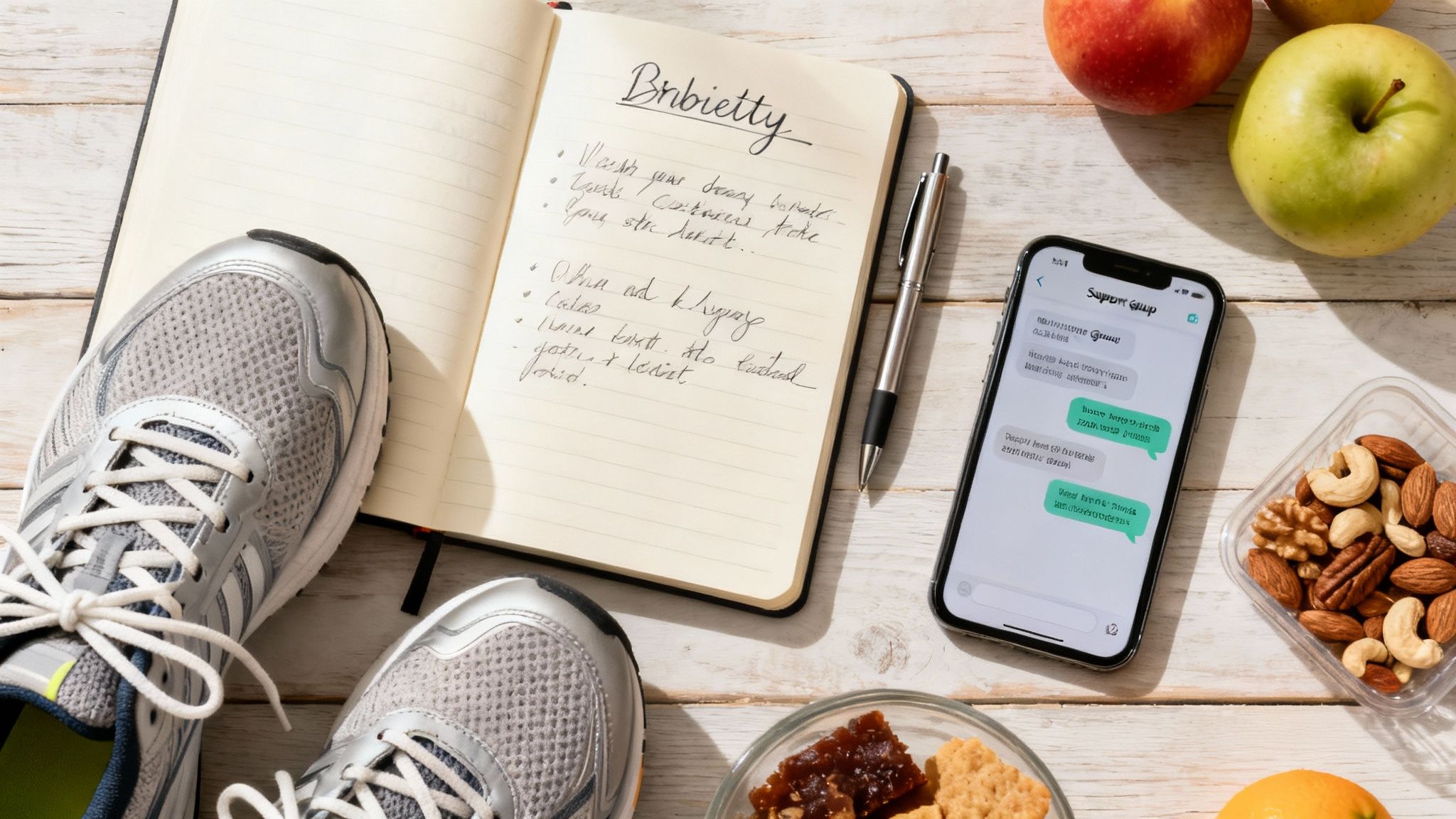 Lasting sobriety isn’t just about putting down the bottle; it’s about intentionally building a life where you don’t need it. To do that, you need a new set of tools—practical strategies, healthier habits, and a solid support system to help you navigate life’s challenges without alcohol.
Lasting sobriety isn’t just about putting down the bottle; it’s about intentionally building a life where you don’t need it. To do that, you need a new set of tools—practical strategies, healthier habits, and a solid support system to help you navigate life’s challenges without alcohol.
Think of it like creating a personalized toolkit. A mechanic doesn’t use a hammer for every job, and you won’t use the same coping skill for every situation. It’s all about having the right tool ready for whatever comes your way.
Identifying Your Personal Triggers
First things first: you have to figure out what makes you want to drink. Triggers are those specific situations, feelings, people, or even times of day that spark a craving. Getting brutally honest here is the key to learning how to quit liquor for good.
For some, it’s the crushing stress after a long workday. For others, it might be the loneliness of a Friday night or the sight of old drinking buddies. Your triggers are unique to you, and naming them is the first step toward disarming them.
Grab a notebook and start a simple list. Think back to the last few times you felt a powerful urge to drink. Ask yourself:
- Where were you? (e.g., at home alone, at a bar with friends)
- Who were you with? (e.g., a specific person, a group of coworkers)
- What were you feeling? (e.g., stressed, bored, anxious, celebratory)
- What time of day was it? (e.g., right after work, late at night)
Once you see a pattern, you can start building a plan. If happy hour is a minefield, maybe you schedule a workout class for that exact time. If boredom is the enemy, have a go-to list of engaging activities ready to pull out.
Building New Routines and Habits
Drinking habits often fill voids in our schedules. To kick them to the curb, you need to deliberately create new, healthier routines that bring structure and purpose back into your days.
This doesn’t mean you need to blow up your entire life overnight. Start small. Really small. If your ritual was pouring a drink the second you walked in the door, replace it with something else. Maybe you make a fancy cup of herbal tea, take a quick walk around the block, or put on a podcast you love.
The goal is to replace the old, automatic behavior with a new, conscious choice. Over time, these small actions build on each other, creating a new foundation for your daily life that supports your sobriety.
Building these new habits is so critical because the scale of alcohol’s impact is staggering. In the U.S., over 10% of people aged 12 and older had an alcohol use disorder in 2020. Even more sobering, excessive drinking leads to more than 385 deaths every single day. Creating a strong personal toolkit is your direct response to this challenge—it gives you the structure needed to succeed.
The Power of Your Support System
Let me be clear: you can’t do this alone, and you shouldn’t have to. A strong support system is one of the most powerful tools you’ll ever have. This network can be a mix of trusted friends, family, a therapist, or formal support groups.
The most important thing is finding people you can be completely honest with—people who will celebrate your wins and have your back when you’re struggling, all without judgment. Let a few key people know what you’re going through and tell them exactly how they can help. Sometimes, all you need is someone to answer the phone when a craving hits hard.
Celebrate Small Wins and Track Your Progress
Sobriety is a journey made up of thousands of small decisions, one day at a time. You have to acknowledge your progress to stay motivated. Did you get through a ridiculously stressful day without drinking? That’s a win. Celebrate it. Did you hit one week, two weeks, or 30 days sober? That’s a huge deal.
Tracking your progress makes these wins feel real and tangible. Using an app like Soberly helps you see your sober streak grow, log your urges, and celebrate every milestone. Seeing that visual proof of how far you’ve come is incredibly empowering.
Journaling is another fantastic tool. It’s a private space to untangle your feelings, keep an eye on your triggers, and remind yourself of your “why.” If you’re staring at a blank page and don’t know where to start, using guided prompts can be a lifesaver. Our article on mental health journal prompts for self-discovery is a great place to begin exploring your thoughts and cementing your commitment.
Handling Social Life Without Alcohol
One of the biggest hurdles when you decide to stop drinking is the fear that your social life will just… die. It’s a common worry, but I can tell you from experience, it’s mostly a myth. Your social life isn’t over. In fact, it’s about to get a whole lot more real.
Feeling anxious before your first sober party or happy hour? That’s completely normal. For a long time, alcohol might have been your go-to social crutch. Now, you get the chance to build genuine connections without it, and that’s a skill that will serve you for life.
Your Social Playbook For Any Event
Walking into a social event with a plan is the secret to feeling confident and staying in control. You don’t have to become a hermit. You just need to re-think how you show up.
Before you even head out the door, map out your strategy:
- BYOB (Bring Your Own Beverage): This is a game-changer. Don’t rely on the host to have something you like. Tossing a six-pack of La Croix or your favorite kombucha in a bag guarantees you’ll have a safe, tasty drink in your hand all night.
- Plan Your Exit: Decide before you arrive when you’re going to leave. Saying something like, “I can only pop in for an hour,” gives you an easy out and keeps you from feeling stuck as the night wears on.
- Eat First: Never, ever go to an event hungry. A solid meal beforehand helps keep your mood stable and can seriously cut down on cravings.
Confident Phrases to Turn Down a Drink
That moment someone offers you a drink can feel like a pop quiz you didn’t study for. The key is to have a few simple, polite phrases locked and loaded. You don’t owe anyone a dissertation on your life choices.
Give one of these a try. They work.
- “No thanks, I’m good for now.”
- “I’m not drinking tonight, but I’d love some water!”
- “Appreciate it, but I’m driving.”
- “I’m taking a little break from booze.”
Keep your tone light, friendly, and then pivot the conversation. Most people won’t even blink. If someone gets pushy, remember that their reaction is about their relationship with alcohol, not yours. A firm but friendly “No, I’m good” is all you need.
Having a go-to non-alcoholic option can make these situations even easier. For instance, whipping up a refreshing mojito mint mocktail recipe to bring along can be a fun way to participate without the alcohol.
The infographic below highlights some interesting differences between social events with and without alcohol.
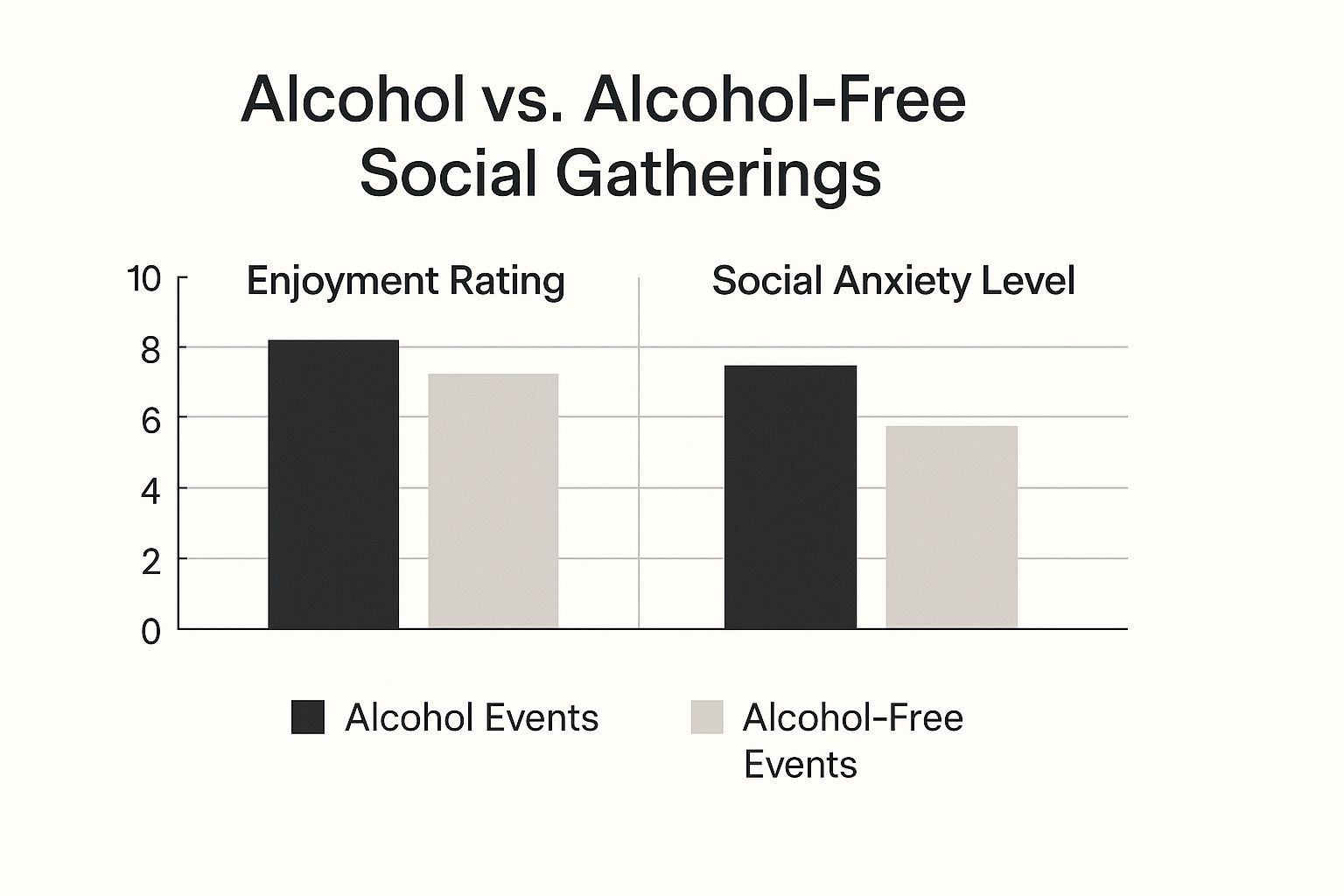
As you can see, the data backs up what many people discover on their own: you often have a better time and feel less anxious at alcohol-free events. It totally flips the script on the idea that you need a drink to have fun.
Building a New Sober Social Life
Learning to navigate your old haunts is one thing, but the real magic happens when you start building a new social life that isn’t centered around alcohol. This is your chance to dive into hobbies and activities where drinking is an afterthought, not the main event.
Your social world is about to get richer, not smaller. You’re shifting from activities fueled by alcohol to connections fueled by shared passions and genuine presence.
What have you always wanted to try? Maybe it’s a hiking club, a pottery class, or a local volleyball league. These are incredible places to meet people who are there for the activity itself. Your shared interest is the icebreaker, not what’s in your glass.
This doesn’t happen overnight, of course. It takes a little effort to find these groups and put yourself out there. But the payoff is huge: deep, meaningful friendships built on who you truly are. You’re not just quitting liquor; you’re building a life you don’t feel the need to escape from.
Creating a Proactive Relapse Prevention Plan
Staying sober isn’t a passive sport—it’s about playing offense. Building a solid relapse prevention plan means you’re thinking ahead, anticipating the curveballs life will inevitably throw at you, and getting your responses ready before you’re in a tough spot.
This isn’t about being afraid of messing up. It’s about weaving a safety net so strong that if you stumble, you’re caught before you fall. A good plan gives you a clear path back to your goals, turning what could feel like a crisis into a moment you can manage and, importantly, learn from.
It’s a mindset that’s catching on. Public attitudes are shifting, and you’re not alone in this. In a major trend, the percentage of Americans who drink has dropped to 54% in 2024, down from over 60% in years past. This cultural shift, fueled partly by movements like “Dry January,” shows you’re part of a growing community choosing a healthier path. You can dig into more of these consumer behavior changes at Gallup.
Recognizing Your Personal Warning Signs
A relapse rarely just happens. It’s almost always preceded by subtle shifts in your thinking and behavior—the kind of things you might brush off if you aren’t paying attention. Learning to spot your own unique warning signs is the most powerful first step you can take.
These signals often start small. Maybe you catch yourself romanticizing the “good old days” of drinking, conveniently editing out the hangovers and regret. Or perhaps you start pulling back from people, skipping your support meetings, or letting those new healthy habits slide.
Think of these as the yellow lights on your car’s dashboard. They aren’t a disaster, but they are a clear signal to slow down, check in with yourself, and make a course correction right away.
Developing Healthy Coping Skills
A huge piece of your plan is figuring out new, constructive ways to handle the big emotions that used to send you straight to a drink. Stress, boredom, anxiety, and loneliness are incredibly powerful triggers. If you don’t have healthy coping skills in your back pocket, you’re vulnerable when they show up.
Your new toolkit needs to be practical and easy to grab. Here are a few ideas to get you going:
- For Stress: Instead of pouring a drink after a long day, try a brisk 15-minute walk outside, run through some deep breathing exercises, or just put on a playlist that chills you out. Getting your body moving is an incredible and immediate stress-buster.
- For Boredom: Boredom is often just a gap in your schedule. Make a “go-to” list of things you actually enjoy—getting lost in a good book, tinkering with a hobby, calling a friend, or tackling that small project you’ve been putting off.
- For Anxiety: When your mind starts racing, grounding techniques can pull you back to the here and now. Give the 5-4-3-2-1 method a try: name five things you can see, four you can touch, three you can hear, two you can smell, and one you can taste.
The real trick is to practice these skills when you’re feeling good. That way, they become automatic when you’re actually struggling.
Think of it this way: You wouldn’t wait until your house is on fire to look for the extinguisher. Your coping skills are your fire extinguishers. Have them ready, know where they are, and know how to use them.
To help you put this into practice, it’s useful to see how a warning sign and a proactive response connect directly. Recognizing the sign is half the battle; knowing exactly what to do next is the other half.
Relapse Warning Signs vs Proactive Responses
| Relapse Warning Sign | Proactive Response Strategy |
|---|---|
| Romanticizing past drinking experiences | Immediately call a sober friend or sponsor and talk honestly about the real consequences of your past drinking. |
| Isolating yourself or skipping support meetings | Commit to attending one meeting or calling one support person within the next hour. Don’t wait. |
| Feeling overly stressed or overwhelmed | Engage in a physical activity for at least 15 minutes—a walk, a quick workout, or even some stretching. |
| Testing boundaries (e.g., going to a bar “just for soda”) | Acknowledge this as a high-risk situation. Leave immediately and go somewhere you feel safe and supported. |
| Neglecting self-care (poor sleep, diet, exercise) | Pick one small, manageable self-care action you can do right now. Drink a glass of water, eat a healthy snack, or do 5 minutes of meditation. |
This table isn’t just a list; it’s a playbook. When you feel that old thinking creep in, you can look at this and know exactly what your next move is. Having a plan takes the guesswork out of a critical moment.
What to Do If a Slip Happens
Let’s be real for a moment: sometimes, a slip happens, even with the best plan in the world. The absolute most important thing to remember is that a slip is not a failure. It does not wipe out all the progress you’ve made.
Instead of seeing it as a catastrophe, frame it as a data point. It’s a moment to pause, figure out what went wrong, and learn from it so it doesn’t happen again.
If you have a drink, here’s your immediate action plan:
- Stop. Immediately. Don’t let one drink turn into a full-blown relapse. The decision to stop again, right in that moment, is the most powerful one you can make.
- Reach Out for Support. This is no time for shame or isolation. Call someone on your emergency contact list—a trusted friend, a family member, your sponsor. Be completely honest about what happened.
- Analyze the Trigger. Once you’re in a safe place, think back on what led to the slip. What warning signs did you miss? What trigger caught you off guard this time?
- Reinforce Your Plan. Use this new information to make your relapse prevention plan stronger. Did you need a better coping skill for that specific situation? Do you need to avoid a certain place or person for a while?
The goal is to get back on track as quickly as possible. This journey of learning how to quit drinking liquor isn’t about being perfect; it’s about being persistent. Every single day you choose sobriety is a win.
Common Questions About Quitting Liquor
Deciding to quit drinking is a massive step, and it’s completely natural for your mind to be buzzing with questions. You’re not just changing a single habit; you’re redesigning a huge part of your life, and that comes with a lot of unknowns. Getting clear, honest answers can give you the confidence you need to move forward.
This section tackles some of the most frequent concerns that come up when people start this journey. Think of it as a practical FAQ for the road ahead, filled with real insights into what you can expect and how to handle it.
How Long Until I Feel Normal Again?
This is the big one, isn’t it? The honest answer is that there’s no magic number. Everyone’s body and mind heal at their own pace. Physically, the toughest acute withdrawal symptoms usually peak within the first 72 hours and mostly settle down within a week or so.
Mentally and emotionally, though, it’s more of a marathon than a sprint. Many people notice huge improvements in sleep, energy, and mental clarity within the first month. These are some of the first incredible benefits of sobriety that start to show up. It’s also important to know about Post-Acute Withdrawal Symptoms (PAWS), which can pop up for months. These are things like mood swings and sudden anxiety that can catch you off guard.
The key is seeing this as a gradual process with good days and bad days, not a straight line to a finish line called ‘normal.’ Every single sober day is a win that moves you forward.
Can I Just Drink Less Instead of Quitting for Good?
This is a really personal question that demands radical honesty. For someone with a history of alcohol dependency—or anyone who has tried and failed to moderate over and over—quitting completely is often a much simpler and more direct path to freedom. It completely removes that exhausting mental bargaining of “how much is too much?”
If your attempts to “cut back” have always spiraled back into heavy drinking, that’s a pretty clear sign that moderation is a trap for you. For someone who is just “sober curious” and doesn’t have a dependency, trying to moderate might be a reasonable starting point. But if your real goal is to break free from the negative grip liquor has on your life, abstinence is almost always the most effective way to do it.
What Are The Best Support Options Out There?
Support is absolutely essential, and the good news is there are more options today than ever before. The “best” one is simply the one you feel comfortable with and will actually stick with. Don’t be afraid to try a few things to see what feels right.
- Peer Groups: Communities like Alcoholics Anonymous (AA) or secular alternatives like SMART Recovery offer priceless support from people who just get it.
- Digital Tools: Modern apps like Soberly give you tracking tools, online communities, and daily accountability right in your pocket. It’s support on your terms.
- Professional Help: Working with a therapist or addiction counselor can help you dig into the why behind your drinking and build coping strategies that are made just for you.
For an even wider range of help and inspiration, you can also explore comprehensive resources on sobriety and recovery that offer tools and encouragement for your journey.
How Do I Actually Deal With Intense Cravings?
Cravings feel urgent and all-consuming, but you have to remember this: they are always temporary. They are like waves in the ocean—they build, they crest, and then they always, always pass. Having a few go-to techniques ready can help you ride them out without giving in.
One of the most powerful mental tricks is to “play the tape forward.” When an urge hits, don’t just fantasize about that first drink. Force yourself to visualize what happens after that—the negative consequences, the crushing hangover, the regret, and all the reasons you wanted to quit in the first place. This snaps you right back to reality.
Distraction is also your best friend. Get up and immediately change your environment. Go for a brisk walk, call a friend, or blast your favorite playlist. Having a go-to non-alcoholic drink on hand, like a sparkling water with lime, can also satisfy that ritualistic hand-to-mouth habit. The more you practice riding out these urges, the less power they will have over you.
Ready to take control of your sobriety journey? Soberly provides the tools you need to track your progress, celebrate milestones, and stay accountable every step of the way. Download the app and start building a healthier, happier life today at https://getsoberly.com.